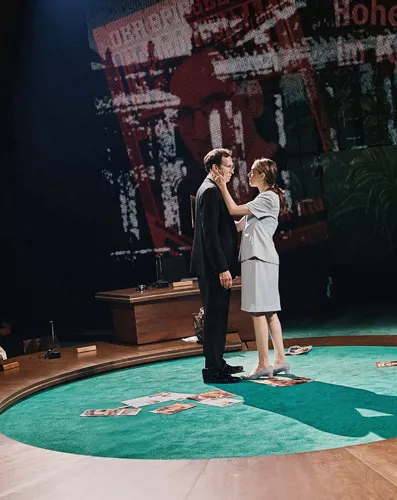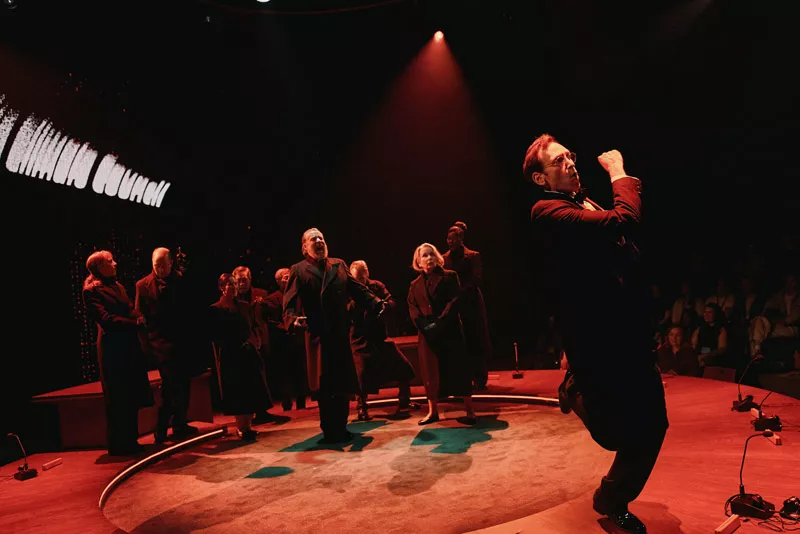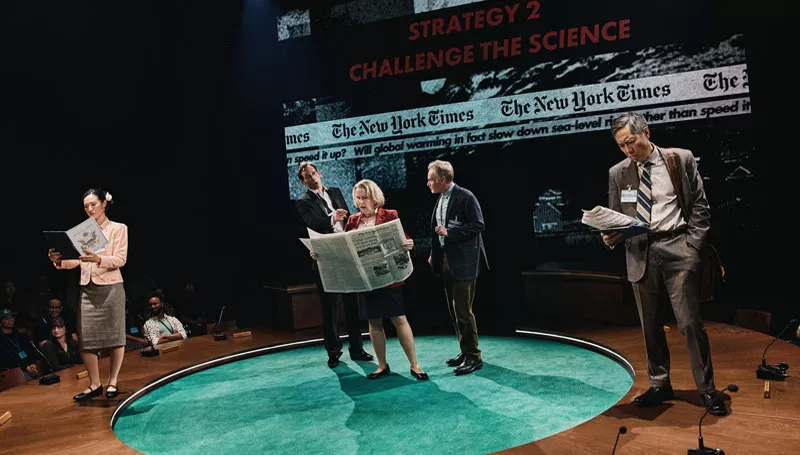Glenda Frank in New York
11 November 2025
★★★☆☆
Climate change makes the news almost every day with one disaster following another. The summer saw wildfires around the globe. There were massive floods and homes were lost. Lives were blighted or destroyed. As observers we have come to file all natural disasters – tornadoes, earthquakes, volcanos – under the umbrella of climate change. Despite our obsession, climate change is challenging as the stuff or raw material for drama. Drama is about human emotions, about relationships, and unexpected choices. Even Bernard Shaw, who excelled in plays about ideas would add dollops of romance as a leavening agent and to tempt the palate.

Photo credit: Emilio Madrid.
Kyoto, written by Joe Murphy and Joe Robertson (The Jungle), now at the Mitzi E. Newhouse Theater at Lincoln Center, explores the intricate path to the 1997 Kyoto Climate Protocol. It took years of passionate discussions and some wily ploys by Raúl Estrada-Oyuela, Chairman of the Negotiating Committee for the United Nations Framework Convention on Climate Change (UNFCCC), to thwart powerful lobbying by fossil fuel groups and pass the 1997 agreement. The play forestages the courage and determination of several representatives who refused to give up. The power of Kyoto lies in these characters, whose actions live beyond their stage presence.
The set by Miriam Buether is a semi-circular table where actors representing countries are seated next to audience members. They raise signs with their countries’ names when they want to speak, and they speak at times in English, at times in their native tongues so that we understand that the conference was a tower of Babel. Most of these players blur into each other, a feature that blunts dramatic possibilities. At other times, the tedious details of negotiations and lawyerly language disputes add a soporific effect. Even though scenes may go on too long, they leave a powerful impression. Kyoto is a stronger work retrospectively as one joins up dots and reflects on it later. And that is an aspect that may make it all the more effective as a piece of political theatre.

Photo credit: Emilio Madrid.
Our guide and narrator is Don Pearlman (Stephen Kunken), an oil lobbyist. Although he has the most stage time and we get to know his attractive wife (Natalie Gold), he remains a plot device. The lanky, nervous Kunken is a curious casting choice. In the premiere production of Paula Vogel’s masterpiece How I Learned to Drive, the revelations at the end are even more horrific because the charismatic David Morse played the pedophile.
At two hours and 40 minutes, Kyoto has a great many repetitions, and the direction by Stephen Daldry and Justin Martin suffered from a lack of tonal and mood variation. Kate Burton (Hedda Gabler, Tony nomination) was one of the few actors who succeeded in turning these problems into a memorable performance. Her frustration with the proceedings worked like flashes of lightning, and with each iteration she brought home the urgency and human cost of not reaching an accord.
The performances of two other actors were also stand-outs. Everything about Erin Darke as an early-career Germany/Angela Merkel, Minister for the Environment, Nature Conservation and Nuclear Safety, was crisp and focused on the job at hand. She was a woman who didn’t dilly dally. Taiana Tully (New York debut) as the representative from Kiribati, an endangered island nation of 80,000 inhabitants, proved a focus in her two arias, pleading for the more powerful nations to do something before her country vanished. Her rage, reason and charm not only made us listen but changed the dynamic of conferences that preceded the Kyoto meeting. The members realized they had to divide the plenary group into two negotiating bodies, developed and developing nations.
Saudi Arabia (Dariush Kashani), representing the members of OPEC, is the villain of the play, bribing several nations to vote against the accord. Raúl Estrada-Oyuela, the hero of the piece, represented Argentina. Determined to leave less to chance, he strategized by shortening the debates and keeping the diplomats awake all night to wear them down. He himself rested before the final vote and never stopped reasoning with the hold outs, shooting down the blatantly unfair proposals. The protocol was passed unanimously with everyone compromising.
Kyoto is a flawed play in a flawed production, but it is worth seeing and thinking about. The many successful elements include evocative video clips by Akhila Krishnan.


AloJapan.com